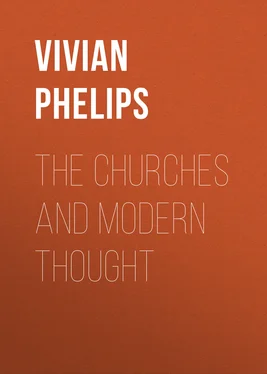Vivian Phelips - The Churches and Modern Thought
Здесь есть возможность читать онлайн «Vivian Phelips - The Churches and Modern Thought» — ознакомительный отрывок электронной книги совершенно бесплатно, а после прочтения отрывка купить полную версию. В некоторых случаях можно слушать аудио, скачать через торрент в формате fb2 и присутствует краткое содержание. Жанр: foreign_prose, foreign_religion, Философия, foreign_antique, на английском языке. Описание произведения, (предисловие) а так же отзывы посетителей доступны на портале библиотеки ЛибКат.
- Название:The Churches and Modern Thought
- Автор:
- Жанр:
- Год:неизвестен
- ISBN:нет данных
- Рейтинг книги:4 / 5. Голосов: 1
-
Избранное:Добавить в избранное
- Отзывы:
-
Ваша оценка:
- 80
- 1
- 2
- 3
- 4
- 5
The Churches and Modern Thought: краткое содержание, описание и аннотация
Предлагаем к чтению аннотацию, описание, краткое содержание или предисловие (зависит от того, что написал сам автор книги «The Churches and Modern Thought»). Если вы не нашли необходимую информацию о книге — напишите в комментариях, мы постараемся отыскать её.
The Churches and Modern Thought — читать онлайн ознакомительный отрывок
Ниже представлен текст книги, разбитый по страницам. Система сохранения места последней прочитанной страницы, позволяет с удобством читать онлайн бесплатно книгу «The Churches and Modern Thought», без необходимости каждый раз заново искать на чём Вы остановились. Поставьте закладку, и сможете в любой момент перейти на страницу, на которой закончили чтение.
Интервал:
Закладка:
Whether hastened or not by the action of the propagandist, the masses, in these days of universal education, are bound to hear sooner or later of these grave doubts. The questioners of the Faith are no longer only the philosophers, scientists, and those who join hands with the Churches in prescribing a dietary of fairy tales for the preservation of the moral health of the masses. Many of the working class 24 24 I omit all mention of the trading or domestic classes who often depend directly for their support on strict religionists. The way in which “their bread is buttered” is bound to enter considerably into their calculations, and also they have often even less leisure for the study of modern thought than a steady (temperate) working man.
are far more thoughtful and intelligent regarding questions of science as it affects religion than is generally supposed. Hitherto they have been under two very considerable disadvantages—the costliness of the books and the want of leisure to read them. The leisure disability still holds good, though less so now that temperance is on the increase; but the books are to-day offered at popular prices, and are also finding their way into public libraries. The Church can, perhaps, depend for some time to come upon the non-interference and even active support of the upper classes, however sceptical they may be; but it is the proletariat which she will in future have to deal with more and more. She is in a dilemma; her hand is forced. She realises that discussion will cause the unsettlement of minds hitherto unclouded by doubt, and yet matters have reached a stage when silence is impossible. It is doubtful whether she has yet fully realised the gravity of the task before her. I have explained how she seems to have been deceived as to the real meaning of the apparent suspension of hostilities during the past few years. She has also to learn how impossible it will be for the ordinary mind to accept the unconvincing and contradictory expositions of the Faith which are now offered to us under the title of Christian apologetics.
§ 5. Apologetics “Found Wanting.”
The time, then, has arrived when the pastor can no longer ignore or gloze over the thoughts that are stirring the minds of the intelligent portion of his flock. The cheap literature problem cannot be solved by applying disparaging adjectives, such as “shallow,” to writings emanating from the pens of Darwin, Huxley, Tyndall, S. Laing, Matthew Arnold, Sir Leslie Stephen, Renan, Haeckel, etc., easy though it be to excite prejudice by the use of a condemnatory adjective. Books that are still costly will some day be available at popular prices, and increase the perplexities of the people. I refer to books of the type of Lecky’s Rise and Influence of Rationalism in Europe , Buckle’s History of Civilisation in England , Frazer’s Golden Bough , Forlong’s Short Studies of the Science of Comparative Religions , Doane’s Bible Myths and their Parallels in other Religions , J. M. Robertson’s Christianity and Mythology and Pagan Christs , Spencer’s Principles of Sociology (Vol. I., Part I., giving the Data of Sociology), Metchnikoff’s The Nature of Man , Haeckel’s The Evolution of Man , 25 25 A cheap edition has since been published by the R. P. A.
etc. Will not the Encyclopædia Biblica , with a title so innocent, and with an editor and many of its contributors in Holy Orders, soon find its way into our public libraries and be a thorn in the side of the orthodox? Think how a book such as Nunquam’s (Robert Blatchford) God and My Neighbour must already have been read by and have affected the convictions of thousands of the working class. And the grave doubts of a hard-headed artisan are not in the least likely to be dispelled by Anti-Nunquam , 26 26 Anti-Nunquam , by Dr. Warschauer, with prefatory note by J. Estlin Carpenter, is considered by many Churchmen to be an admirable refutation of God and My Neighbour . I have seldom read anything less likely to convince. Sentence after sentence is open to the gravest exception.
or any of the literature so far published as a panacea “in relief of doubt.” 27 27 See Appendix.
Indeed, some apologetic works are enough in themselves to create mistrust, though the reader had not read a single anti-Christian work! The extraordinary divergence in the views of the authors, to say nothing of the transparency of some of their arguments, prevents all chance of apologetics convincing any but those already determined to be convinced. The writer in one stage of thought absolutely contradicts a writer in another stage. Compare Goulburn and Pusey in their awful assertions of everlasting punishment with Allin’s Universalism Asserted and Larger Hope leaflets, or the views of a Wace regarding Evolution with the views of a Waggett. If we confine ourselves to making comparisons only between the advanced thinkers themselves, compare the opinions of Dr. Gore, Bishop of Birmingham (late of Worcester), with those of Canons Henson and Cheyne. The deplorable state of religious apologetics is becoming notorious, and articles bearing on the subject are now appearing from time to time in our leading magazines. 28 28 E.g. , in the Nineteenth Century and After , see the article on “The Present Position of Religious Apologetics,” appearing in the issue for October, 1903; or on “Freethought in the Church of England” in the issues for September and December, 1904. The answers in the same journal are most unsatisfactory, and only serve to show how very little, apparently, can be said in reply.
In defending the Faith the advanced school of the Church now frankly admit the difficulties of the old belief, and ask us to accept their new interpretations of Christianity. The older school of theologians, the school who can bring themselves neither to assert the truth of evolution nor to give a decided opinion on the verbal inspiration of the Bible, are unwillingly, very unwillingly, beginning to follow in their wake. The views of the two schools being in conflict on many vital points, it is impossible that they can ever be brought into agreement. Yet, unless concerted measures are soon taken, confusion will be worse confounded. To add to the perplexity of the situation, there are also the various views of the Nonconformists to be taken into account. Then there are the Scottish Churches, having on the one side the law-supported minority, standing for an infallible Bible and all the doctrines of John Calvin; and, on the other, the majority standing for a form of Christianity which is really Calvinism with a somewhat unequally-applied veneer of Higher Criticism. Finally there is the Irish Roman Catholic Church still sunk in the gross superstitions of the Dark Ages.
The advanced school represent the section which is in close touch with modern thought, so that their new interpretations of the Faith constitute the one and only hope of arresting the advance of agnosticism. On the other hand, the justice of the objections to these new interpretations is borne out by the circumstance that many of the older school would no more think of accepting them than they would of giving up their belief; rather than accept them they prefer to deny the facts of science. Both sides do violence to their reason—the enlightened in using the subtleties of their intellect for interpretations which appear transparently false alike to the orthodox and to the unbeliever; the obscurantist in denying established facts. Consider for a moment what all this means. It means that the modern sceptic has the support of the strictly orthodox when he refutes the only explanations as yet offered to dispel his doubts. It means that the validity of the agnostic’s objections to these new-fangled interpretations is fully borne out by the common sense of Christians themselves, and that a denial of the facts of science and of the results of Biblical research is the only way we can escape from unbelief. If a puzzled truth-seeker tried to take a middle course, he would have to believe that black and white were the same colour, and his belief would degenerate into an exceedingly unedifying grey. There is a large proportion of this “grey” belief just now.
Читать дальшеИнтервал:
Закладка:
Похожие книги на «The Churches and Modern Thought»
Представляем Вашему вниманию похожие книги на «The Churches and Modern Thought» списком для выбора. Мы отобрали схожую по названию и смыслу литературу в надежде предоставить читателям больше вариантов отыскать новые, интересные, ещё непрочитанные произведения.
Обсуждение, отзывы о книге «The Churches and Modern Thought» и просто собственные мнения читателей. Оставьте ваши комментарии, напишите, что Вы думаете о произведении, его смысле или главных героях. Укажите что конкретно понравилось, а что нет, и почему Вы так считаете.












